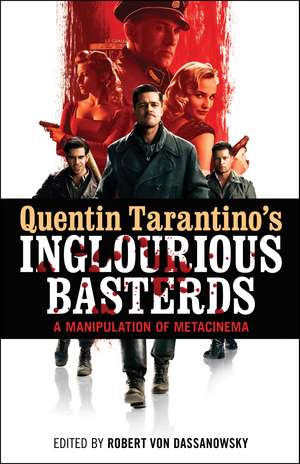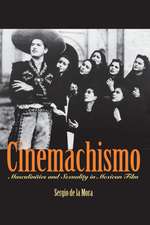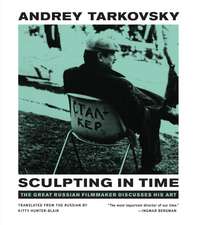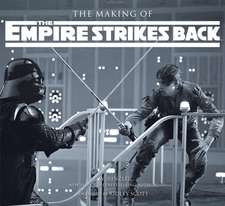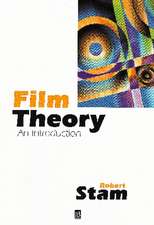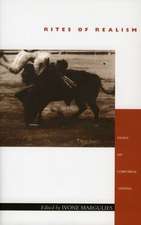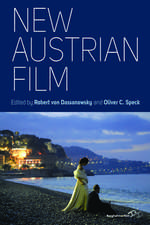Quentin Tarantino's Inglourious Basterds: A Manipulation of Metacinema
Editat de Professor or Dr. Robert von Dassanowskyen Limba Engleză Paperback – 29 aug 2012
| Toate formatele și edițiile | Preț | Express |
|---|---|---|
| Paperback (1) | 168.15 lei 6-8 săpt. | |
| Bloomsbury Publishing – 29 aug 2012 | 168.15 lei 6-8 săpt. | |
| Hardback (1) | 570.43 lei 6-8 săpt. | |
| Bloomsbury Publishing – 29 aug 2012 | 570.43 lei 6-8 săpt. |
Preț: 168.15 lei
Preț vechi: 193.14 lei
-13% Nou
Puncte Express: 252
Preț estimativ în valută:
32.17€ • 33.68$ • 26.62£
32.17€ • 33.68$ • 26.62£
Carte tipărită la comandă
Livrare economică 05-19 aprilie
Preluare comenzi: 021 569.72.76
Specificații
ISBN-13: 9781441138699
ISBN-10: 1441138692
Pagini: 332
Ilustrații: 12
Dimensiuni: 138 x 216 x 23 mm
Greutate: 0.45 kg
Ediția:New.
Editura: Bloomsbury Publishing
Colecția Continuum
Locul publicării:New York, United States
ISBN-10: 1441138692
Pagini: 332
Ilustrații: 12
Dimensiuni: 138 x 216 x 23 mm
Greutate: 0.45 kg
Ediția:New.
Editura: Bloomsbury Publishing
Colecția Continuum
Locul publicării:New York, United States
Caracteristici
Top-class line-up of UK, US and Canadian scholars, from Film and German Studies
Notă biografică
Robert von Dassanowsky is Professor of German and Film, and Carnegie/CASE Professor of the Year (Colorado) at U Colorado, Colorado Springs. Publications include Austrian Cinema: A History; Gale Encyclopedia of Multicultural America (ed); New Austrian Film (ed. w/ Oliver Speck) and Hofmannsthal's "Der Schwierige" (ed. w/Martin Liebscher). He is also an independent film producer.
Cuprins
Introduction: Locating Mr. Tarantino or, Who's Afraid of Metacinema? Robert von Dassanowsky 1) The Grand IllousionSrikanth Srinivasan 2) Exploding Cinema, Exploding Hollywood: Inglourious Basterds and the Problems of Cinematic ConventionImke Meyer 3) A Slight Duplication of Efforts: Redundancy and the Excessive Camera in Inglourious BasterdsChris Fujiwara 4) Inglourious Music: Revenge, Reflexivity and Morricone as Muse in Ingloruious Basterds Lisa Coulthard 5) Lulu's Menorah: Seeing and Nazi-ingJustin Vicari 6) Vengeful Violence: Inglourious Basterds, Allohistory, and the Inversion of Victims and PerpetratorsMichael D. Richardson 7) Inglourious Basterds and the Gender of RevengeHeidi Schlipphacke 8) Reels of Justice: Inglourious Basterds, The Sorrow and the Pity and Jewish Revenge Fantasies Eric Kligerman9) 'Fire!' in a Crowded Theater: Liquidating History in Inglourious BasterdsSharon Willis 10) Is Tarantino serious? The Twofold Image of the Auteur and the State of Exception Oliver C. Speck11) Disruptive Violence as Means to Create a Space for Reflection: Thoughts on Tarantino's Attempts at Audience Irritation Alexander D. Ornella 12) Counterfactuals, Quantum Physics and Cruel Monsters in Tarantino's Inglourious BasterdsWilliam Brown 13) "What shall the history books read?" The Debate over Inglourious Basterds and the Limits of Representation Todd Herzog Notes on Contributors Index
Recenzii
In Inglourious Basterds, Quentin Tarantino "might just have made his masterpiece." Equal parts (allo-)history and Jewish revenge fantasy, a high-minded paean to cinema's power to change the world and a grind-core splatterfest, the film will always be controversial. Now Robert von Dassanowsky has assembled a team of scholars to give Basterds what it has lacked up to now: a rigorous intellectual analysis representing the best trends in modern scholarship and film criticism. Containing tightly written essays that roam widely over areas of culture, gender, semiotics, and memory, this volume will be indispensable to students of film, war, and the intersection between the two. -- Robert M. Citino, author of Death of the Wehrmacht (2007) and Associate Professor of History at the University of North Texas
Quentin Tarantino's Inglourious Basterds: A Manipulation of Metacinema, edited by renowned cinema historian Robert von Dassanowsky, provides a comprehensive overview of Tarantino's allohistory about World War II that brings together thirteen experts to analyze a variety of topics. The film's counterfactual structure combines with Tarantino's postmodern obsession with citations from the history of the cinema to present a formidable challenge to film audiences, critics, scholars and historians. But von Dassanowsky and his band of intrepid critics are as equal to this intellectual challenge as Tarantino's Inglourious Basterds are to bringing about the destruction of the Third Reich. The book's essays plus the editor's concise and masterful introduction cover virtually everything the educated general reader, film buff, or professional scholar might want discussed: the influence of other directors on Tarantino (Godard, Bertolucci, and others); Tarantino's fascination with cinema about cinema and how his films play with the most amusing and disparate of sources (the James Bond franchise; Ennio Morricone's dramatic musical scores; the Italian spaghetti western and the giallo thriller; Hollywood war films and B-movies in general); more general ethical questions touching upon the Holocaust and how its traditional filmic representation might be challenged or parodied; historical counterfactuals; Jewish and female revenge fantasies; and a host of other fascinating topics. This book should be required reading for anyone wishing to understand Tarantino's entire career as well as the postmodern persuasion in contemporary cinema. Highly recommended! --Peter Bondanella, Distinguished Professor Emeritus of Comparative Literature, Film Studies, and Italian (Indiana University)
The wide variety of perspectives with which the articles in this anthology approach Quentin Tarantino's Inglourious Basterds account for the film's large-scale significance as one of the grand works of cinematic art in the twenty-first century. Therefore this book is an important contribution to the controversies Tarantino's 'Masterpiece' launched all across the globe. Being the first collection of scholarly essays solely dedicated to Inglourious Basterds, it provides an excellent overview of the film's complex and often provocative stands toward history, gender, war movie genres, violence, victimization and the representation of nazi aesthetics, as well as of the range of cinematic techniques by which the film achieves its drastic effectivity. --Mimmi Woisnitza, University of Chicago, Germanic Studies
Quentin Tarantino's Inglourious Basterds: A Manipulation of Metacinema will be undoubtedly useful to anyone who studies film but also to students of gender studies. Of course, Inglourious Basterds is a complicated film, for which reason no one book can fully analyze it, so there is plenty of room for further scholarship on this tremendous movie. This book is a more than worthy place to start.
Quentin Tarantino's Inglourious Basterds: A Manipulation of Metacinema, edited by renowned cinema historian Robert von Dassanowsky, provides a comprehensive overview of Tarantino's allohistory about World War II that brings together thirteen experts to analyze a variety of topics. The film's counterfactual structure combines with Tarantino's postmodern obsession with citations from the history of the cinema to present a formidable challenge to film audiences, critics, scholars and historians. But von Dassanowsky and his band of intrepid critics are as equal to this intellectual challenge as Tarantino's Inglourious Basterds are to bringing about the destruction of the Third Reich. The book's essays plus the editor's concise and masterful introduction cover virtually everything the educated general reader, film buff, or professional scholar might want discussed: the influence of other directors on Tarantino (Godard, Bertolucci, and others); Tarantino's fascination with cinema about cinema and how his films play with the most amusing and disparate of sources (the James Bond franchise; Ennio Morricone's dramatic musical scores; the Italian spaghetti western and the giallo thriller; Hollywood war films and B-movies in general); more general ethical questions touching upon the Holocaust and how its traditional filmic representation might be challenged or parodied; historical counterfactuals; Jewish and female revenge fantasies; and a host of other fascinating topics. This book should be required reading for anyone wishing to understand Tarantino's entire career as well as the postmodern persuasion in contemporary cinema. Highly recommended! --Peter Bondanella, Distinguished Professor Emeritus of Comparative Literature, Film Studies, and Italian (Indiana University)
The wide variety of perspectives with which the articles in this anthology approach Quentin Tarantino's Inglourious Basterds account for the film's large-scale significance as one of the grand works of cinematic art in the twenty-first century. Therefore this book is an important contribution to the controversies Tarantino's 'Masterpiece' launched all across the globe. Being the first collection of scholarly essays solely dedicated to Inglourious Basterds, it provides an excellent overview of the film's complex and often provocative stands toward history, gender, war movie genres, violence, victimization and the representation of nazi aesthetics, as well as of the range of cinematic techniques by which the film achieves its drastic effectivity. --Mimmi Woisnitza, University of Chicago, Germanic Studies
Quentin Tarantino's Inglourious Basterds: A Manipulation of Metacinema will be undoubtedly useful to anyone who studies film but also to students of gender studies. Of course, Inglourious Basterds is a complicated film, for which reason no one book can fully analyze it, so there is plenty of room for further scholarship on this tremendous movie. This book is a more than worthy place to start.
